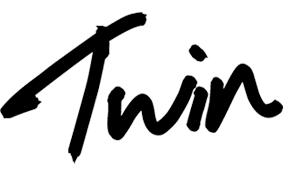This weekend, Twin’s art editor Francesca Gavin opened up her exhibit The Dark Cube at Palais de Tokyo in Paris. An experiment combining static art and UV light, the literally ‘glow in the dark’ experience applies neon colour and an innovative viewing experience of every artwork from Kasper Sonne’s Untitled (carpet) No. 3, which is given a colour kick thanks to luminescent paint, to Scott Treleaven’s painting The Body Electric, with five of the piece’s six floating bodies immersed in a neon orange glow for a further intensification of its dreamlike feeling. Like all good things subject to limited availability, the exhibit runs until next Monday.
Twin spoke to Gavin about modern-day psychedelia, electronic nature and teenage memories of Camden market’s Cyber Dog…
From disco to rave, UV lighting has had quite a history in it its own right. What made the time ripe to do this exhibition now?
I think it’s to do with our relationship with technology. Many of my exhibitions in the past have explored that relationship – how we look at screens, the psychedelic experience of going on the internet. This is actually my least high tech exhibition but I think that this now old fashioned technology feels very relevant in terms of contemporary feelings about the world of wires, electrics and Wifi around us.
How did you go about choosing which artists to display?
A few artists I know had worked with UV in the past – Jeremy Shaw, Jeremy Deller and Thomas Dozol. Many I had worked with before, others I had seen work that I felt would fit. It was very organic. A number of the artists – Oliver Laric, Anne de Vries, Juliette Bonneviot – were part of that Berlin post-internet scene which I felt really connected to the idea.
What was the process of putting it all together like, for example where there any changes in vision throughout the project?
In a way it was like putting on an exhibition in the dark! It was impossible to know the results until I turned on the black lights and saw the works glow. A lot of the artists were making things partly in normal light and at night with hand held small black lights. It felt quite risky compared to a normal exhibition when you just have to work with the hang and hope the screens work okay!
A large part of the exhibition aims at literally looking at things in a different light. Would you say that it is a reaction against the times of our short attention span digital generation or is it something else?
I think because we are so used to seeing the entire world through a screen that the process of looking at objects, at images, at things in real time is really important. Arguably something with political undertones. Thought it was fascinating see many of the hundreds of visitors who came during the opening on Nuit Blanche immediately want to engage with the work through their camera phones. UV also ends up being an interesting metaphor for the electronic nature we give to the world in our screen culture.
On a more personal note, what are your own fondest black light memories?
I grew up near Camden market and when I was at the end of my teens it was the early days of techno. My sister was going to free parties and was part of the whole Spiral Tribe scene. Very hardcore. She was obsessed with reflective materials and circuitry. We used to go to this T shirt stall in a sort of cave-cellar there by a label called Cyber Dog (which over the years turned into a crazy huge techno mecca) and I bought a shirt with a circuitry star on it that glowed in UV… For a brief moment it was the epitome of cool.
What future projects do you have lined up?
No shows lined up quite yet – I’ve done three this year which feels like a lot! Possibly an exhibition at a project space in Belleville in the spring. And of course the acres of writing for Dazed, Twin, AnOther, Sleek and the rest.
The Dark Cube is on display until October 15th at Palais de Tokyo.





 PREVIOUS
PREVIOUS

 Twitter
Twitter
 Tumblr
Tumblr
 YouTube
YouTube
 Facebook
Facebook
 Instagram
Instagram
